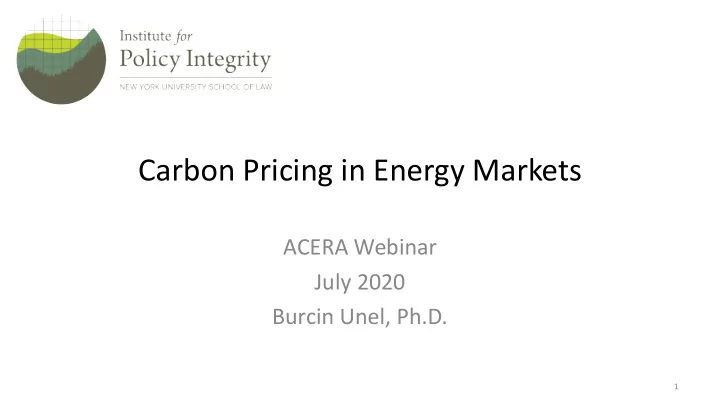

Carbon Pricing in Energy Markets ACERA Webinar July 2020 Burcin Unel, Ph.D. 1
Overview • Design principles • Mechanics of carbon pricing • Benefits of carbon pricing • Case studies – NYISO – Chile • Recommendations 2
Why Carbon Pricing? • First-best way to internalize the externality • Is technology neutral • Provides efficient investment signals • Can address leakage • Creates revenue that can be redistributed 3
Principles for Effective Carbon Pricing • The market price of electricity should reflect the marginal social cost of electricity generation – Both consumers and producers should face this price signal – Carbon tax should be at least as high as the Social Cost of Carbon – Polluters should pay for the damages caused by their emissions • The scope of the carbon-pricing rule in an organized wholesale market design should include all producers and consumers of electricity bought and sold in that market • If the carbon-pricing rule is incomplete it should optimally mitigate leakage 4
Carbon Pricing in Wholesale Markets 5
Carbon Pricing in Wholesale Markets 6
Carbon Pricing in Wholesale Markets 7
Carbon Pricing in Wholesale Markets 8
Benefits of Carbon Pricing • Increases costs of operating fossil-fuel resources in proportion to their CO 2 intensity • Increases energy prices to reflect the social marginal cost of electricity • Provides granular price signals reflecting the social cost of electricity 9
NYISO’s Carbon Pricing Proposal • New York State sets a carbon price – Current analysis is based on the IWG’s Social Cost of Carbon – Regional Greenhouse Gas Initiative price • Emitting generators pay for their emissions • Cleaner resources receive higher revenues • Any remaining carbon charge residual is credited to utilities • Border adjustments to prevent leakage 10
Carbon Tax in Chile • Price – $5 per metric ton • Pass-through restrictions – Tax is not considered in dispatch • Side payment rules – Any tax that cannot be covered by spot prices must be socialized 11
Recommendations • A price level and a rate of increase that is more aligned with the Social Cost of Carbon • Economic dispatch based on the social marginal cost • Polluters should pay based on their emissions 12
Thank you! For questions and comments: burcin.unel@nyu.edu +1 (212) 992-6285 13
Recommend
More recommend